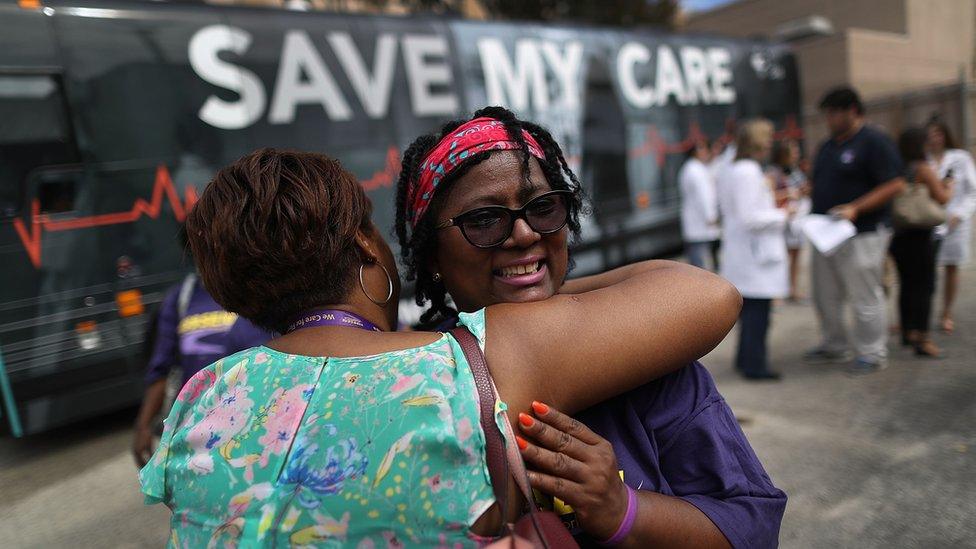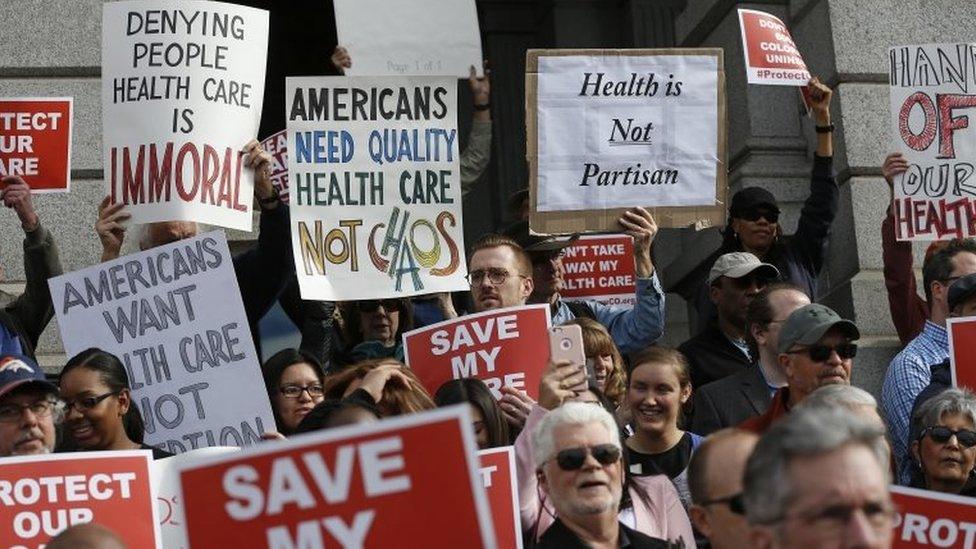The rise of Obamacare: Why is the ACA so popular?
- Published

A handful of recent polls have found more support for Obamacare than ever before
Nobel-winning psychologist Daniel Kahneman famously pioneered the idea that people tend to fear loss twice as much as they prefer gains.
Loss aversion, he said, is when people feel the pain of losing something more than they feel the pleasure of gaining something else, which can leave some wary of taking risks.
That could be why the threat of losing the Patient Protection and Affordable Care Act (ACA), known as Obamacare, has led to more support for the healthcare law than ever before.
Why is Obamacare so controversial?
Republican lawmakers marked a victory after the House of Representatives passed a bill to repeal and replace Obamacare.
The American Health Care Act (AHCA) narrowly passed after an earlier attempt in March was derailed by a lack of support. The bill now heads to the Senate, where it is likely to face challenges.
US "at boiling point": Town halls target Trump's agenda
But the congressional plan to remove Obamacare has left some Americans unnerved as the healthcare law's expiry date looms.
"People are looking at what they're losing and it's not clear what they'll be gaining," says Thomas D'Aunno, director of the health policy and management at New York University's Robert F Wagner Graduate School of Public Service.
An uncertain future about the country's healthcare is "playing into people's stronger attachment to the ACA", he says.
That sentiment is felt by Americans like Cathy DeLoach, who changed her mind on the ACA after her son was diagnosed with testicular cancer and her family spent $29,000 (£23,000) on treatment costs in 15 days.
"I stayed with him in the hospital and I had a lot of time to think about how grateful I was for the Affordable Care Act," she told the BBC.
Mrs DeLoach, who did not vote for Mr Obama in 2008 and 2012, said she was not a fan of the law when it was first passed, but now worries for her son's future.
"This really is something that could be so awful for so many people, and so many poor people, and it's wrong."
How has public opinion shifted?
Trump's 100 days: Getting presidential?
A recent Health Tracking Poll, external from the Kaiser Family Foundation found the highest level of favourability for the ACA in more than 60 tracking polls since 2010, when President Barack Obama signed it into law.
The poll found that 48% of Americans approved of the ACA while 42% said it was unfavourable.
At its lowest favourability in November 2013, just 33% approved of it.
Ashley Kirzinger, a senior survey analyst at Kaiser, said that while it is not a majority of Americans who share this view, the shift underscores American concerns amid a heated debate about its replacement in Washington.
A handful of other polls echoed these findings.
"To a certain extent much of the debate over the years has been a referendum on the Obama administration," says Michael Sparer, chair of the department of health policy and management at Columbia University.
"Opposition to the law very effectively painted it as an expensive bureaucratic interference in the American healthcare system," he said. "But the debate is shifting a little bit from pure rhetoric to what would actually happen if the law was gone."
What is the Republican hold-up?
There has been growing hesitation among some Republicans about outright replacing the law, with some suggesting a modification plan as the right way forward.
Former Speaker John Boehner has even said a full repeal of the law is "not what's going to happen".
It's estimated about 22 million Americans would lose medical insurance if the law is repealed.
Many Republicans support the plan to repeal parts of the law, including replacing income-based subsidies with tax credits based on a person's age, but some lawmakers cast doubt on the latest draft.

Protest over the ACA has grown since Mr Trump was elected
But some of the law's protections - banning insurance companies from denying health coverage to people with pre-existing health conditions and allowing young people to remain on their parents' plans until age 26 - have also gained public support.
In fact, the Kaiser poll found that 84% of respondents said it was important that federal support for expansion of Medicaid, a federal government healthcare programme for low-income Americans, remain in place.
"Unfortunately, there are some people who don't realise the ACA was responsible for Medicaid expansion," Mr D'Aunno points out. "So it makes sense there would be some shift in support for a government role in healthcare."
The survey showed that 95% of Democrats, 84% of independents and 69% of Republicans said it was "very" or "somewhat" important to maintain federal funding for the expansion.
"Republicans have a lot of challenges ahead of them," says Dr Ashish Jha, the director of the Harvard Global Health Institute.
"The single most important part of Obama's legacy on the ACA is weaving into the American fabric the notion that everyone deserves access to healthcare."
The fear of losing Obamacare has been exacerbated by a grassroots movement at town halls nationwide, where hundreds of constituents have aired their grievances to Republican lawmakers over Mr Trump's policies - including the ACA's future.
"Looking your representative in the eye and saying, 'I am deeply concerned that I am going to lose my health insurance' is a lot more powerful than a clever chant," Mr Williams says.